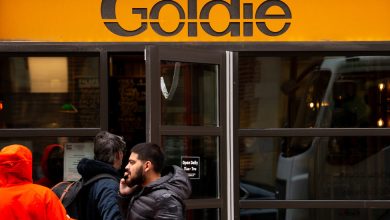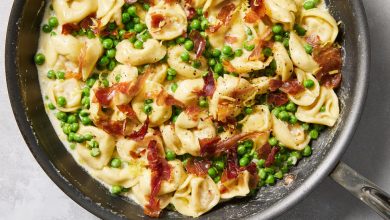In West Oakland, Barbecue Is Back — With a Side of Fried Chicken

OAKLAND, Calif. — If you’re in this jumbled, chatty line, enveloped in the music and wood smoke by Mandela Parkway, you’re waiting for Matt Horn’s barbecue.
The tight, snappy hot links and the juicy pulled pork. The beef ribs with a thick bark of smoke and pepper. The brisket, cut to order so it’s still hot and steamy, the fat soft and sweet and gelatinous, the meat itself a little wobbly. If you’re lucky, maybe you’re there on a day when Mr. Horn has smoked some oxtails, or whole ducks (with the heads on).
The line moves much faster than it used to, when Horn Barbecue opened at the end of 2020, but even the handful of preorders taken online, picked up at the back of the restaurant, aren’t cut until you come and claim them.
And this means you do wait a bit, which is as it should be: Mr. Horn is doing right by that Central Texas-style brisket, which peaks in the moments just after it’s cut, when the meat is still supple and sticky. (If you’re taking it to go, not to one of the picnic tables in the back, make sure to pry off the foil lid and try some immediately.)
Look around, and this industrial stretch appears as an uncertain and even lonely spot for a restaurant, but that wasn’t always the case. West Oakland, particularly Seventh Street, was once a hub for Black cultural life and Black-owned businesses, and even defined the East Bay’s barbecue scene. And before decades of targeted development pushed families out and shuttered businesses, it was a thriving scene.

At Horn Barbecue, in West Oakland, Calif., customers wait in line for Matt Horn’s smoked meats. Credit…Carolyn Fong for The New York Times
In January, Mr. Horn opened a second restaurant a few blocks away. Kowbird has a concise menu — a few fried chicken sandwiches, a half chicken or wings on soft white bread and a sweet-potato poundcake or candy apples for dessert.
And if you’ve ordered the pit-smoked chicken from Horn, with its deeply golden skin and dense, succulent meat, then you already know this: Don’t underestimate the chicken.
True, the fried-chicken sandwich has become a kind of cliché, a cheap and indistinguishable fast-food enterprise fueled by massive meat-processing plants, produced at unimaginable scale and priced impossibly low. But the sandwich doesn’t have to be fast food. And $15 is a fair price for a sandwich if you think, even for a moment, about the true cost of ingredients and labor.
“My thing, my biggest thing, is the quality of the meat,” said Mr. Horn, who buys chicken from Cream Co. Meats, a processor in Oakland that works with small, regenerative farms in California, including PT Ranch in Ione, Pasturebird in Temecula and Rootdown Farm in Pescadero.
His cooks make big batches of pickles and ferment fresh red chiles in-house, though Mr. Horn trusts Duke’s with the mayonnaise that forms the base of his “bird sauce,” and Martin’s with the bread.
The sandwiches, whether you get them hot, dusted with ghost pepper, or sweet, with a lick of honey butter, are delicious, with crisp grooves of breading that hide deeply seasoned thigh meat. The sandwiches, like Mr. Horn’s barbecue, would make a nice meal no matter where they were. But they’re not anywhere — they’re here.
During the Great Migration, West Oakland’s Black population grew quickly and built a powerful cultural hub along Seventh Street. Harry Mock, an East Bay butcher who immigrated from Guangzhou, China, in the 1930s, documented the barbecue boom that followed World War II in meat sales, overhauling his cold storage to keep up with demand.
At Fair Deal Market, Mr. Mock stocked pork ribs, tails and ears, as well as oxtails, chitlins, ham hocks, neck bones and, around Christmas, hog heads. He hired 10 butchers to work the counter on busy days, slicing slabs of bacon to order, breaking down whole pigs, chickens, goats, rabbits and even the occasional wild deer, if a regular brought one in.
Lana Cano Klock, 80, one of Mr. Mock’s six daughters, remembers making the wholesale deliveries of pork ribs and chicken to the pits that lined Seventh Street and peppered the neighborhood, as well as to big-name kitchens, like Esther Mabry’s club, Esther’s Orbit Room, which opened in 1950. Known simply as Esther’s, the music venue sold fried chicken, pork chops, rice and gravy, as well as chitlins — the dish that Ms. Mabry said kept her in business.
There were plenty of barbecue spots established in the 1940s and ’50s, perfuming the streets with smoke. Jenkins Bar-B-Que, which opened in 1963, stood out with a large wait staff in shiny nylon uniforms and paper hats. Its owner, the Rev. Memphis Jenkins of the King Chapel Missionary Baptist Church, might have disappeared for religious services, but he kept the kitchen open 24 hours a day, which meant that clubgoers and musicians who played on Seventh Street could stop by anytime after sets.
Many of the women who worked for Mr. Jenkins went on to open their own barbecue restaurants in the 1960s and ’70s, including Dorothy Everett, who opened Everett and Jones, right next door to the East Bay Dragons Motorcycle Club, in 1973. Ms. Everett built a brick pit and made her own all-beef links.
“Pork ribs and beef links were our top sellers,” said her daughter, Shirley Dicko-Everett, 67. “And you had to have sauce on the meat — sauce was king!” Most people got barbecue from her family’s restaurant to go, she said, eating it on the curb outside the restaurant, or on the hoods of their cars, off paper plates.
In an interview, Ms. Dicko-Everett recalled the variety of smoked meats from so many other Oakland pits, including Willie Flintroy’s famous restaurant Flint’s, where her mother worked for a few years, and the businesses that lined Seventh Street: Burk’s Seafood & Barbeque, Crissie’s Barbeque Pit, Earle’s Famous Bar-B-Que, Fields Bar None Bar-B-Q and Singer’s Bar-B-Q.
“Black women set the standard for Oakland barbecue,” said Ms. Dicko-Everett, who worked at the original location of her family’s restaurant with her seven sisters. Though it closed decades ago, after a fire, the business is still family-run, with other locations in the area — one of the last from Seventh Street’s heyday.
“Who knew that it would all disappear?” said Ms. Klock, who remembers the construction of the Cypress Viaduct, which opened in 1957, after forcing out more than 500 families. It was the first of several major urban renewal projects in the area, including the construction of a Postal Service Distribution Center and a BART station in the 1960s, that gradually and deliberately displaced the community.
“It’s my ambition to see West Oakland back like it was,” Ms. Mabry said 20 years ago in a taped interview with the African American Museum and Library at Oakland. Her club stayed open until 2010, but all around her, Ms. Mabry watched as families were displaced and Black-owned businesses closed.
By the time Matt Horn started barbecue pop-ups in West Oakland in 2017, it was in a gentrifying neighborhood with a precarious identity, shaped by decades of redlining, urban renewal and disinvestment, vulnerable to soaring housing prices and major development.
He would drag his 500-gallon smoker to Center Street and set it up in a former auto shop, sitting by the fire all night, tending to the meat so it would be ready by 11 in the morning. Mr. Horn didn’t have a restaurant yet, but he thought about what it might be like if he did, where it would be and whom he would hire.
“I spent a lot of time thinking about what I wanted to accomplish and how I wanted to contribute to the neighborhood,” he said. “And I’m not the only one.”
That pop-up location, on Center Street, is now Blk Girls Green House, a store and coffee shop owned by Kalkidan Gebreyohannes and J’Maica Roxanne, where you can sip your tea in a lush, plant-filled courtyard.
Just across the street is where Mr. Horn opened Kowbird, in walking distance from Horn. And next door to Kowbird, Mr. Horn is imagining another food business — a juice and smoothie bar that also sells salads. For now, though, the space is empty.
Kowbird, 1733 Peralta Street, Oakland, Calif.; no phone; kowbird.com
Horn Barbecue, 2534 Mandela Parkway, Oakland, Calif.; 510-225-6101; hornbarbecue.com
Follow NYT Food on Twitter and NYT Cooking on Instagram, Facebook, YouTube and Pinterest. Get regular updates from NYT Cooking, with recipe suggestions, cooking tips and shopping advice.





